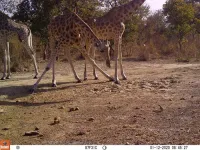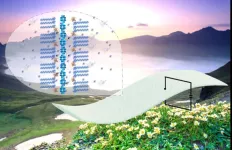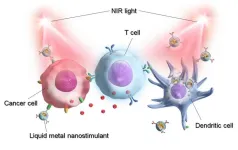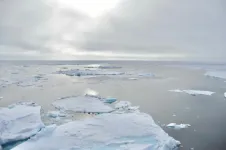Kordofan giraffes face local extinction if poaching continues
2023-08-04
(Press-News.org) For immediate release
Friday 4 August 2023
Kordofan giraffes face local extinction if poaching continues
Poaching of two Critically Endangered Kordofan giraffes per year could result in extinction in just 15 years within Cameroon’s Bénoué National Park without intervention. These are the alarming new findings of a University of Bristol and Bristol Zoological Society-led study published in the African Journal of Ecology.
One of the last populations of Kordofan giraffes roam Cameroon's Bénoué National Park in Africa with current estimates indicating there are fewer than 50 individuals left in the park. Bristol Zoological Society have been working to conserve this highly-threatened mammal since 2017.
While poaching is frequently cited as a cause of population decline, evidence remains mostly anecdotal, with little research into its overall impact. Illegal hunters kill giraffes for their meat but also for their pelts, bones, hair and tails which are highly valued by some cultures.
Researchers from Bristol Vet School and Bristol Zoological Society sought to analyse the effectiveness of different conservation measure interventions using a population modelling technique. The team compared anti-poaching interventions, population supplementation, and habitat protection. Each intervention was simulated individually and in combination to investigate their relative impact on population viability.
Their modelling found the removal of one male and one female giraffe every year would result in an average time to extinction of just 15.3 years. The poaching of female giraffes had a more significant impact on population viability than males.
The team’s findings confirm that conservation management should prioritise strengthening existing anti-poaching activity in conjunction with protecting wildlife corridors to aid dispersal.
Kane Colston, the study’s lead author, who undertook the study as part of his Master’s degree at Bristol Vet School in conjunction with teaching partners Bristol Zoological Society, said: “Our findings confirm anti-poaching measures appear the most significant for population viability. The extent of poaching in Bénoué National Park is still unclear as far higher giraffe poaching rates have been reported in other national parks, but recent confirmed reports of the poaching of two giraffes in a period of just three months highlight the urgency of conservation intervention.”
Dr Sam Penny, the project lead from Bristol Zoological Society, added: “These findings really underscore the magnitude of the threat facing Bénoué National Park's Kordofan giraffe and highlight the importance of our conservation work in the area. We will continue to work with the park’s Conservation Service and our partner NGO Sekakoh to ensure anti-poaching initiatives are prioritised within the landscape.”
Ends
Further information
Study at the Bristol Veterinary School
The University of Bristol offer a number of postgraduate courses including the MSc Global Wildlife Health and Conservation and a range of undergraduate degrees.
Based at Bristol's Langford Campus, Bristol Veterinary School boasts first-class clinical facilities and encompasses a small animal hospital, a dairy farm, diagnostic laboratories, and farm animal, small animal and equine practices.
Conservation at Bristol Zoological Society
We save wildlife together, through conservation science research, working to protect species and habitats overseas, encouraging sustainable behaviours and perceptions, educating tomorrow’s wildlife warriors and connecting people with nature through a great day out.
If you would like to support our global conservation work, please visit https://bristolzoo.org.uk/support to find out ways you can help.
Notes to editors
Images of Kordofan giraffes within Cameroon’s Bénoué National Park
<https://fluff.bris.ac.uk/fluff/u1/ficmc/Ztaqfi825WaAbpMsT5OWPgDu6/>
For further information or to arrange an interview with the researchers from University of Bristol, please contact Joanne Fryer [Mon to Wed], email joanne.fryer@bristol.ac.uk, mobile: +44 (0)7747 768805 or Caroline Clancy [Wed to Fri], email caroline.clancy@bristol.ac.uk, mobile: +44 (0)7776 170238 at the University of Bristol Press Office.
For further information about Bristol Zoological Society or to arrange interviews, please contact Naomi Dymond, email ndymond@bzsociety.org.uk, tel: +44 (0)117 428 5590.
Issued by the University of Bristol media team, in partnership with Bristol Zoological Society media team.
END
[Attachments] See images for this press release:

ELSE PRESS RELEASES FROM THIS DATE:
2023-08-04
Scientists are looking for ways to use the low-value energy widely distributed in natural environments to generate electricity. A research team has created a power generator that collects the natural atmospheric humidity and produces continuous electrical signals. This is the first humidity generator designed using a nano-sized material called polyoxometalates. It holds the potential of being a new research direction for polyoxometalates in the sustainable utilization of low-value energy.
The team’s work is published in the journal Nano Research on August 01.
The team set out to solve ...
2023-08-04
Researchers have developed a pair of modules that gives a boost to the use of artificial neural networks to identify potentially cancerous growths in colonoscopy imagery, traditionally plagued by image noise resulting from the colonoscopy insertion and rotation process itself.
A paper describing the approach was published in the journal CAAI Artificial Intelligence Research on June 30.
Colonoscopy is the gold standard for detecting colorectal growths or ‘polyps’ in the inner lining of your colon, also known as the large intestine. ...
2023-08-04
UNIVERSITY PARK, Pa. — In temperate climates, like North America and Europe, flu season starts in the fall, peaks in the winter and ends in the spring. While public health officials have generally assumed that influenza is also seasonal in tropical climates, new research led by Penn State has found little evidence of a repeatable pattern in influenza cases in Vietnam. The findings suggest that influenza is likely unpredictable throughout the tropics, posing substantial challenges for prevention and management of cases for the one-third of the global population living in tropical areas.
“The World ...
2023-08-04
About The Study: In this study of Massachusetts schools, the secondary attack rate for SARS-CoV-2 among school-based contacts was low during two periods, and factors associated with transmission risk varied over time. These findings suggest that ongoing surveillance efforts may be essential to ensure that both targeted resources and mitigation practices remain optimal and relevant for disease prevention.
Authors: Sandra B. Nelson, M.D., of Massachusetts General Hospital in Boston, is the corresponding author.
To access the embargoed study: Visit our For The Media website at this link https://media.jamanetwork.com/
(doi:10.1001/jamahealthforum.2023.2310)
Editor’s ...
2023-08-04
About The Study: In this study of 230,000 persons with second primary cancers in the U.S., the Black population had a higher risk of death from both cancer and cardiovascular disease compared with the white population, whereas the Hispanic population had a higher risk of death from cancer. These results suggest that research priorities to address survival disparities in the growing population of survivors of multiple primary cancers are warranted.
Authors: Hyuna Sung, Ph.D., of the American Cancer Society in Atlanta, is ...
2023-08-04
ATLANTA, August 4, 2023 — In new findings from researchers at the American Cancer Society (ACS), non-Hispanic Black individuals diagnosed with a second primary cancer (SPC) experienced 21% higher cancer-related death rates and 41% higher cardiovascular-related death rates compared with their non-Hispanic White counterparts. The study also showed that Hispanic individuals diagnosed with a second primary cancer also experienced 10% higher cancer-related death rates compared with their non-Hispanic White counterparts, but 10% lower cardiovascular-related death rates. The paper was published ...
2023-08-04
Ishikawa, Japan -- Liquid metals (LM) such as pure gallium (Ga) and Ga-based alloys are a new class of materials with unique physicochemical properties. One of the most prominent applications of LMs is photothermal therapy against cancer, in which functional LM nanoparticles convert light energy to heat energy, thus killing cancerous cells. LM-based phototherapy is superior to traditional cancer therapy owing to its high specificity, repeatability, and low side effects.
In a new cutting-edge study, Associate Professor Eijiro Miyako and his colleagues from Japan Advanced Institute of Science and Technology (JAIST) synthesized multifunctional Ga-based nanoparticles that combine cancer ...
2023-08-04
Breastfeeding for six months or more appears to reduce the risk of cardiovascular problems developing in mothers for at least three years after delivery, a new South Australian study has found.
The surprising cardio-metabolic benefit for maternal health is particularly important for women who experienced a complicated pregnancy, which can increase their chance of developing cardiovascular disease (CVD) later in life.
The new results – published this month in the International Breastfeeding Journal by experts from the University of Adelaide ...
2023-08-04
Patient-reported outcome (PRO) data are collected in oncology trials to determine patients' perspectives of cancer treatment - unfortunately often too briefly, for example only up to the point when an x-ray shows tumour growth and treatment is discontinued. As a result, it is not possible, for example, to reliably assess the impact on patients' lives of disease progression seen on X-rays or the long-term side effects of cancer treatment. The reasons given for this are organizational difficulties or patients’ lack of interest in long-term follow-up. ...
2023-08-04
A subpolar species associated with Atlantic water expanded far into the Arctic Ocean during the Last Interglacial, analysis of microfossil content of sediment cores reveals. This implies that summers in the Arctic were ice free during this period. The findings are published in Nature Geoscience.
Arctic sea ice, an important component of the Earth system, is disappearing fast under climate warming. Summer sea ice is anticipated to vanish entirely within this century. To gain a deeper understanding of the climate dynamics in a world without Arctic sea ice, researchers have turned to analogues from the geological past.
”The Last Interglacial, between ...
LAST 30 PRESS RELEASES:
[Press-News.org] Kordofan giraffes face local extinction if poaching continues




